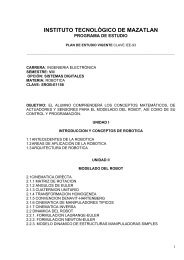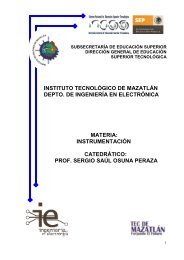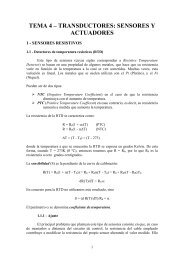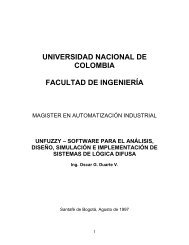- Page 2 and 3:
SOCIALLY INTELLIGENT AGENTSCreating
- Page 4 and 5:
SOCIALLY INTELLIGENT AGENTSCreating
- Page 6 and 7:
ContentsContributing Authors1Social
- Page 8 and 9:
Contents21Experiences with Sparky,
- Page 10 and 11:
Contributing AuthorsAude BillardCom
- Page 12 and 13:
Contributing AuthorsxiPeyman Farati
- Page 14 and 15:
Contributing AuthorsxiiiBernard Ogd
- Page 16:
Contributing AuthorsxvNell TenhaafD
- Page 19 and 20:
2 Socially Intelligent AgentsFigure
- Page 21 and 22:
4 Socially Intelligent AgentsFigure
- Page 23 and 24:
6 Socially Intelligent Agentsthe ag
- Page 25 and 26:
8 Socially Intelligent AgentsThis r
- Page 27 and 28:
10 Socially Intelligent Agentstrack
- Page 29 and 30:
12 Socially Intelligent Agentsintel
- Page 31 and 32:
14 Socially Intelligent Agentsof a
- Page 33 and 34:
16 Socially Intelligent AgentsIn ch
- Page 35 and 36:
18 Socially Intelligent AgentsFigur
- Page 37 and 38:
20 Socially Intelligent Agents[8] P
- Page 39 and 40:
22 Socially Intelligent Agentscontr
- Page 42 and 43:
Understanding Social Intelligence 2
- Page 44 and 45:
Understanding Social Intelligence 2
- Page 46 and 47:
Chapter 3MODELING SOCIAL RELATIONSH
- Page 48 and 49:
Modeling Social Relationship 31soci
- Page 50 and 51:
Modeling Social Relationship 33Figu
- Page 52 and 53:
Modeling Social Relationship 35seco
- Page 54 and 55:
Chapter 4DEVELOPING AGENTS WHO CANR
- Page 56 and 57:
Developing Agents Who Can Relate to
- Page 58 and 59:
Developing Agents Who Can Relate to
- Page 60 and 61:
Developing Agents Who Can Relate to
- Page 62 and 63:
Chapter 5PARTY HOSTS AND TOUR GUIDE
- Page 64 and 65:
Party Hosts and Tour Guides 47conve
- Page 66 and 67:
Party Hosts and Tour Guides 492.2 E
- Page 68 and 69:
Party Hosts and Tour Guides 514. Co
- Page 70 and 71:
Chapter 6INCREASING SIA ARCHITECTUR
- Page 72 and 73:
Adapting to Affect and Personality
- Page 74 and 75:
Adapting to Affect and Personality
- Page 76 and 77:
Adapting to Affect and Personality
- Page 78 and 79:
Chapter 7COOPERATIVE INTERFACE AGEN
- Page 80 and 81:
Cooperative Interface Agents 63cult
- Page 82 and 83:
Cooperative Interface Agents 65will
- Page 84 and 85:
Cooperative Interface Agents 67make
- Page 86 and 87:
Chapter 8PLAYING THE EMOTION GAME W
- Page 88 and 89:
Playing the Emotion Game with Feeli
- Page 90 and 91:
Playing the Emotion Game with Feeli
- Page 92 and 93:
Playing the Emotion Game with Feeli
- Page 94 and 95:
Chapter 9CREATING EMOTION RECOGNITI
- Page 96 and 97:
Emotion Recognition Agents for Spee
- Page 98 and 99:
Emotion Recognition Agents for Spee
- Page 100 and 101:
Emotion Recognition Agents for Spee
- Page 102 and 103:
Chapter 10SOCIAL INTELLIGENCE FOR C
- Page 104 and 105:
Social Intelligence for Computers 8
- Page 106 and 107:
Social Intelligence for Computers 8
- Page 108 and 109:
Social Intelligence for Computers 9
- Page 110 and 111:
Chapter 11EGOCHAT AGENTA Talking Vi
- Page 112 and 113:
EgoChat Agent 95that members in a g
- Page 114 and 115:
EgoChat Agent 97virtualized-ego(A)v
- Page 116 and 117:
EgoChat Agent 99apply EgoChat to a
- Page 118 and 119:
Chapter 12ELECTRIC ELVESAdjustable
- Page 120 and 121:
Electric Elves 103user in the agent
- Page 122 and 123:
Electric Elves 105The delay MDP rea
- Page 124 and 125:
Electric Elves 107intervening, lead
- Page 126 and 127:
Chapter 13BUILDING EMPIRICALLY PLAU
- Page 128 and 129:
Building Empirically Plausible MAS
- Page 130 and 131:
Building Empirically Plausible MAS
- Page 132 and 133:
Building Empirically Plausible MAS
- Page 134 and 135:
Chapter 14ROBOTIC PLAYMATESAnalysin
- Page 136 and 137:
Analysing Interactive Competencies
- Page 138 and 139:
Analysing Interactive Competencies
- Page 140 and 141:
Analysing Interactive Competencies
- Page 142 and 143:
Chapter 15MOBILE ROBOTIC TOYS AND A
- Page 144 and 145:
Mobile Robotic Toys and Autism 127m
- Page 146 and 147:
Mobile Robotic Toys and Autism 129F
- Page 148 and 149:
Mobile Robotic Toys and Autism 131p
- Page 150 and 151:
Chapter 16AFFECTIVE SOCIAL QUESTEmo
- Page 152 and 153:
Affective Social Quest 135Figure 16
- Page 154 and 155:
Affective Social Quest 137tion is t
- Page 156 and 157:
Affective Social Quest 139parents w
- Page 158 and 159:
Chapter 17PEDAGOGICAL SOAPSocially
- Page 160 and 161:
Pedagogical Soap 1432. IPD Backgrou
- Page 162 and 163:
Pedagogical Soap 145EmotionalApprai
- Page 164 and 165:
Pedagogical Soap 147trol their chil
- Page 166 and 167:
Chapter 18DESIGNING SOCIABLE MACHIN
- Page 168 and 169:
Designing Sociable Machines 151Sens
- Page 170 and 171:
Designing Sociable Machines 153crit
- Page 172 and 173:
Designing Sociable Machines 155qual
- Page 174 and 175:
Chapter 19INFANOIDA Babybot that Ex
- Page 176 and 177:
Infanoid 159— are arranged in a 4
- Page 178 and 179:
Infanoid 161subset of the environme
- Page 180 and 181: Infanoid 163To explain the origin o
- Page 182 and 183: Chapter 20PLAY, DREAMS AND IMITATIO
- Page 184 and 185: Play, Dreams and Imitation in Robot
- Page 186 and 187: Play, Dreams and Imitation in Robot
- Page 188 and 189: Play, Dreams and Imitation in Robot
- Page 190 and 191: Chapter 21EXPERIENCES WITH SPARKY,
- Page 192 and 193: Experiences with Sparky, a Social R
- Page 194 and 195: Experiences with Sparky, a Social R
- Page 196 and 197: Experiences with Sparky, a Social R
- Page 198 and 199: Chapter 22SOCIALLY SITUATED PLANNIN
- Page 200 and 201: Socially Situated Planning 183will
- Page 202 and 203: Socially Situated Planning 185chang
- Page 204 and 205: Socially Situated Planning 187of pl
- Page 206 and 207: Chapter 23DESIGNING FOR INTERACTION
- Page 208 and 209: Designing for Interaction 191force
- Page 210 and 211: Designing for Interaction 193ment b
- Page 212 and 213: Designing for Interaction 195ductio
- Page 214 and 215: Chapter 24ME, MY CHARACTER AND THE
- Page 216 and 217: Me, My Character and the Others 199
- Page 218 and 219: Me, My Character and the Others 201
- Page 220 and 221: Me, My Character and the Others 203
- Page 222 and 223: Chapter 25FROM PETS TO STORYROOMSCo
- Page 224 and 225: From PETS to StoryRooms 2074. A Sto
- Page 226 and 227: From PETS to StoryRooms 209realized
- Page 228 and 229: From PETS to StoryRooms 211own Stor
- Page 232 and 233: Socially Intelligent Agents in Educ
- Page 234 and 235: Socially Intelligent Agents in Educ
- Page 236 and 237: Socially Intelligent Agents in Educ
- Page 238 and 239: Chapter 27TOWARDS INTEGRATING PLOT
- Page 240 and 241: Towards Integrating Plot and Charac
- Page 242 and 243: Towards Integrating Plot and Charac
- Page 244 and 245: Towards Integrating Plot and Charac
- Page 246 and 247: Chapter 28THE COOPERATIVE CONTRACTI
- Page 248 and 249: The Cooperative Contract 231relies
- Page 250 and 251: The Cooperative Contract 233To supp
- Page 252 and 253: Chapter 29PERCEPTIONS OF SELF IN AR
- Page 254 and 255: Perceptions of Self 237semination o
- Page 256 and 257: Perceptions of Self 239Figure 29.1.
- Page 258 and 259: Perceptions of Self 241human senses
- Page 260 and 261: Chapter 30MULTI-AGENT CONTRACT NEGO
- Page 262 and 263: Multi-Agent Contract Negotiation 24
- Page 264 and 265: Multi-Agent Contract Negotiation 24
- Page 266 and 267: Multi-Agent Contract Negotiation 24
- Page 268 and 269: Chapter 31CHALLENGES IN AGENT BASED
- Page 270 and 271: Challenges in ABSS of Negotiation 2
- Page 272 and 273: Challenges in ABSS of Negotiation 2
- Page 274 and 275: Challenges in ABSS of Negotiation 2
- Page 276 and 277: Chapter 32ENABLING OPEN AGENT INSTI
- Page 278 and 279: Enabling Open Agent Institutions 26
- Page 280 and 281:
Enabling Open Agent Institutions 26
- Page 282 and 283:
Enabling Open Agent Institutions 26
- Page 284 and 285:
Chapter 33EMBODIED CONVERSATIONAL A
- Page 286 and 287:
ECA’s In E-Commerce Applications
- Page 288 and 289:
ECA’s In E-Commerce Applications
- Page 290 and 291:
ECA’s In E-Commerce Applications
- Page 292 and 293:
Index"like-me" test 85,89“Giant3
- Page 294 and 295:
INDEX 277educational computer games
- Page 296 and 297:
INDEX 279mutual selection 243mutual
- Page 298:
INDEX 281theory of dramatic writing
















